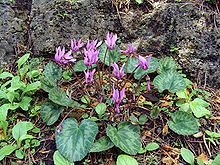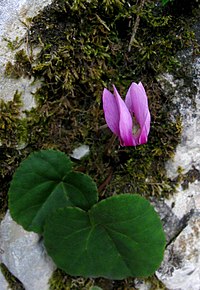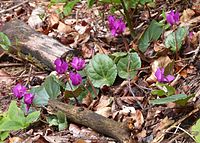Cyclamen purpurascens
| Cyclamen purpurascens | |
|---|---|

| |
| Scientific classification | |
| Kingdom: | |
| (unranked): | |
| (unranked): | |
| (unranked): | |
| Order: | |
| Family: | |
| Genus: | |
| Subgenus: | |
| Series: | |
| Species: | C. purpurascens
|
| Binomial name | |
| Cyclamen purpurascens | |
| Synonyms | |
|
Cyclamen europaeum L. | |
Cyclamen purpurascens (Alpine, European or purple cyclamen) is a species of flowering plant in the genus Cyclamen of the family Primulaceae, native to central Europe, northern Italy, and Slovenia. It is a tuberous perennial with (usually) variegated leaves, and deep pink flowers in summer.[1][2][3]
Etymology
The species name purpurāscēns is a present participle from the Latin verb purpurāscō "become purple".[4]
Distribution
Cyclamen purpurascens grows in deciduous or mixed woodland, especially among beeches and over limestone, at 250–1,300 m (800–4,300 ft) above sea level in continental Europe from eastern France across the Alps to Poland and south to Bosnia and Herzegovina. It is also found in mountainous parts of Romania and western Russia, where it has been introduced.
Description
-
Whole plant (Thomé, Flora von Deutschland)
-
Closeup of flower
-
Seed-bearing stem beginning to coil
-
Two nearly ripe seed pods
-
A young tuber
-
Leaf
C. purpurascens blooms from summer to autumn, keeps its leaves through the winter, and produces seeds and new leaves the next summer.
Tuber
Flowers and leaves come from buds at the top of a round-flattened tuber. Roots come from the sides and bottom. Older tubers may become distorted, forming "fingers" with separate growth points.[5] Misshapen tubers are also found in Cyclamen rohlfsianum.
Flowers
Flowers appear before or with the leaves, and have 5 upswept petals. Flowers are sweetly scented, ranging in color from pale rose-pink to purple or rose-carmine and are 17 to 25 mm (0.67 to 0.98 in) long. Petals are elliptical and twisted, often curled into auricles, although less prominent than those of Cyclamen hederifolium. Forma "album" has white flowers, though it is more difficult to establish. 'Lake Garda' has silver leaves and pink flowers.[1]
This plant has gained the Royal Horticultural Society's Award of Garden Merit.[6]
Leaves
Leaves are kidney-shaped to heart-shaped, as wide as long or wider. The leaf edge is smooth or slightly toothed, unlike the closely related species Cyclamen colchicum, which is always prominently toothed. Leaf color varies from all-green to all-silver, but the most common pattern is green with light green to silver marbling that roughly follows the outline of the leaf. The underside is red-purple. Because of the cool and moist climate in the plant's native range, it is almost evergreen: new leaves appear in summer while the old leaves are fading. All other cyclamens, except for the closely related Cyclamen colchicum, are summer-dormant in their native range.
Fruit
After fertilization, the flower stem coils tightly, starting at the end. Seeds, amber when ripe, are held in a round pod, which ripens the summer a year after flowering and opens by 5-10 flaps.
Subdivisions
Flower forms
Cyclamen purpurascens has three naturally occurring forms, distinguished by flower color:
- Cyclamen purpurascens f. purpurascens — pink to purple flowers
- Cyclamen purpurascens f. carmineolineatum — white flowers with thin band of carmine
- Cyclamen purpurascens f. album — all-white flowers
Leaf forms
Plain leaf
Plain leaf forms have all-green leaves. A distinct plain-leaf form is the Fatra form, also called Cyclamen fatrense (misspelled fatranse), from the Fatra Mountains in Slovakia, which has plain leaves (either matt or shiny) and larger and more abundant flowers.
Silver leaf
Plants of the Silver Leaf Group have silver on the leaves. Subtypes include the Lake Bled form (silver with a netted pattern of veins near the margin), selected from plants near Lake Bled in the Julian Alps of Slovenia, and the Limone or Lake Garda form (silver with a very thin green border and gray arrowhead pattern in the center), selected from plants near Limone sul Garda near Lake Garda in Italy.
Other leaf patterns in the Lake Garda area include dark green with silver or lighter green marbling and plain green.[7]
Cultivars
The cultivated variety 'Green Ice', developed by Jan Bravenboer of Green Ice Nursery in the Netherlands, has a Christmas tree–shaped silver center and broad green margin. 'Green Lake' is similar, but has a light green zone in the center of the silver.[8]
Gallery
-
A plain-leaved form at Plitvice Lakes National Park, Croatia
-
A silver-leaved form with light pink flowers
References
- ^ a b Christopher Grey-Wilson (16 September 2009). The Rock Garden Plant Primer: Easy, Small Plants for Containers, Patios, and the Open Garden. Timber Press. pp. 86–87. ISBN 978-0-88192-928-7. Retrieved 31 August 2012.
- ^ RHS A-Z encyclopedia of garden plants. United Kingdom: Dorling Kindersley. 2008. p. 1136. ISBN 1405332964.
- ^ "Cyclamen purpurascens". Royal Horticultural Society. Retrieved 22 July 2013.
- ^ purpurāscō. Charlton T. Lewis and Charles Short. A Latin Dictionary on Perseus Project.
- ^ Unusual Cyclamen purpurascens growth behaviour (photos of tuber). Scottish Rock Garden Club Forum.
- ^ http://apps.rhs.org.uk/plantselector/plant?plantid=611
- ^ Cyclamen around Lago di Garda. Scottish Rock Garden Club Forum.
- ^ Seed list. Green Ice Nursery.
Books
- C. Grey-Wilson. Cyclamen: a guide for gardeners, horticulturists, and botanists. 1997.
External links
- Cyclamen Society
- Germplasm Resources Information Network
- CalPhotos
- photos of regular form;
Cyclamen fatrense (BOTANY.cz) - Template:Sk icon Cyclamen fatrense (photos) — Atlas Rastlín, Nahuby.sk
- flowers: Slovenia 2008 (Julian Alps) — Scottish Rock Garden Club Forum
- photo of plain-leaved form (Bulb Log Diary, 30 July 2008)
- Leaf Patterning in Cyclamen purpurascens in Slovenia
- RHS Plant Selector
- Pacific Bulb Society










